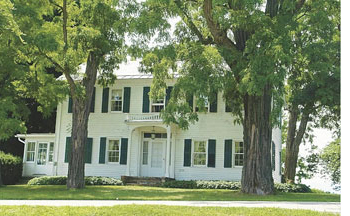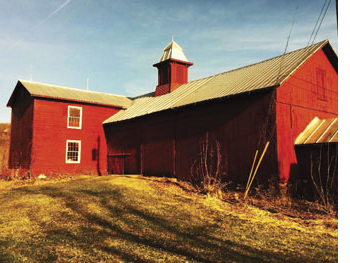| Historic Clemmons Farm Becomes a Multicultural Center | |||||||||||||||||
| by Cynthia Close | |||||||||||||||||
The Clemmons Family Farm is the birthplace of A Sense of Place project. Spearheaded by Lydia’s daughter and namesake, Lydia Clemmons, the project’s executive director, the project’s goal is to turn the farm from a private enterprise to an internationally recognized African American heritage and multicultural center. The project recently received a prestigious $350,000 grant from ArtPlace America’s National Creative Placemaking Fund. A Sense of Place was one of 23 projects that were selected after a very rigorous review of 987 applications. The project’s management team had gathered that March afternoon at the 1990s Bog House, perched on the edge of an open field, to discuss their collective vision for the project and to share their goals. Along with the elder and younger Lydias were Sarah Katz of Burlington City Arts, who is the project’s fiscal sponsor; Champlain College associate dean of administration Rosalynne Whitaker-Heck, EdD, APR, who is director of communication for the project; and Charlotte resident and journalist Susan Crockenberg. Joining the discussion by phone was dancer-choreographer Christal Brown, founder of Inspirit, a dance company. Inspirit is an institutional partner along with Building Heritage, Champlain College, the Vermont Youth Conservation Corps, and Burlington City Arts.
But the younger Lydia is bucking this trend. Recognizing the unique contribution her parents made not only to farming and local history but also to the existence of African culture in the whitest state in the union, she took it upon herself to transform the farm, with her parents blessing, into a nonprofit cultural center.
The Clemmons Family Farm is modeled to some extent after its neighbor, Shelburne Farms. It includes six historically significant structures: the Main House, a lovingly restored 1778 colonial home; the Big Barn, a dairy cow and horse barn; the Barn House; the Shed; and the Blacksmith Shop. Its sustainable farmland and surrounding forests, ponds, and streams were recently included as a site on the state of Vermont’s African-American Heritage Trail, established in 2013. Early in March 2018, the Vermont Advisory Council on Historic Preservation awarded the Clemmons Family Farm a $15,000 matching grant to restore the Big Barn a massive two-story structure that housed dairy cows, sheep, horses, pigs, and poultry from the early 1800s up to the mid 1990s. It was also a place where the Clemmons family children as well as the local community loved to work and play. The Big Barn features a unique 13-foot-high historic wooden cistern, which will be included in the preservation plans. Under the Sense of Place project, some of the Big Barn’s interior spaces will be redesigned to accommodate African American and African diaspora visual and performing arts programs for the local community. Brown is most excited about utilizing the space for contemporary dance performances.
The Clemmons family connection to Africa, its people and culture, is not theoretical or simply a fact of history. It is tied to their travel, living, and work experiences across that vast continent. The younger Lydia was the first to turn her eyes toward Africa. Although her parents expected their intelligent, academically inclined eldest daughter to follow in their footsteps and attend med school, she decided to join the Peace Corps and headed out to remote villages in what was then Zaire (now called the Democratic Republic of Congo). They may have hoped she would get the wanderlust out of her system, but that initial foray morphed into a more than 35-year career working to improve the lives of African people in more than 20 countries through education and other means of support.
Once Lydia’s parents accepted her chosen work in Africa, they, then in their 70s, decided to take their backpacks and explore Africa for themselves. They made connections with many artisans, and upon return to their Vermont home, the elder Lydia decided to open a business importing and selling museum-quality African art in the historic Blacksmith Shop that her husband had restored on their Charlotte farm. Authentica African Art Imports became the first African art mail-order import business in the United States. Authentica was the go-to source for textiles and clothes for local African American and African diaspora cultural events organized by students at UVM, Middlebury College, and other Vermont colleges and public schools. The elder Lydia also took African art to new audiences. Supported by grants from the Vermont Council of the Arts, she went on tour, bringing African culture into grade school and high school classrooms across the state and kept the business in operation until the early 2000s. Many of the remaining beautiful objects, paintings, furniture, and musical instruments from her import business are now being used to decorate and furnish the farm’s historic buildings, as the Clemmons Family Farm becomes open to the public under its newly envisioned nonprofit form. Other Vermont women who are joining in this effort include Peggy Briggs a journalist and video producer serving as the project’s culinary heritage and arts adviser. Briggs is currently completing her master’s degree in food studies at New York University. There are plans for an African diaspora culinary heritage program on the farm. Marissa Coleman is the monitoring and reporting consultant for the project based on her work as a clinical psychologist. Zymora Davinchi, an 18-year-old Hazen Union High School senior, will be the culture and youth adviser, an acknowledgment of the importance of the project’s educational goals. The informative Clemmons Family Farm website (www.clemmonsfamilyfarm.org) sums it up best: “Our mission is to be ‘more than a farm’ by offering curated opportunities for visitors to celebrate the history, culture, arts and sciences of the African-American and African diaspora in a magical setting. We actively promote the celebration of heritage as a continuum in which we learn from our past, shape our present, and invest in our future.” We can all look forward in the coming weeks and months to additional guided tours of the property and historic buildings; educational talks and demonstrations; cooking lessons and pop-up meals; music, dance, and theater performances; art exhibits and cultural events; multicultural community gatherings; outreach to local primary schools; and sharing Clemmons family stories and storytelling that trace more than 150 years of African American history. |
|||||||||||||||||
|
Cynthia Close is a contributing editor for Documentary Magazine, art editor for the literary journal Mud Season Review, and an adviser to the Vermont International Film Festival. She lives in Burlington, Vermont.
|
||||||||||||||||







